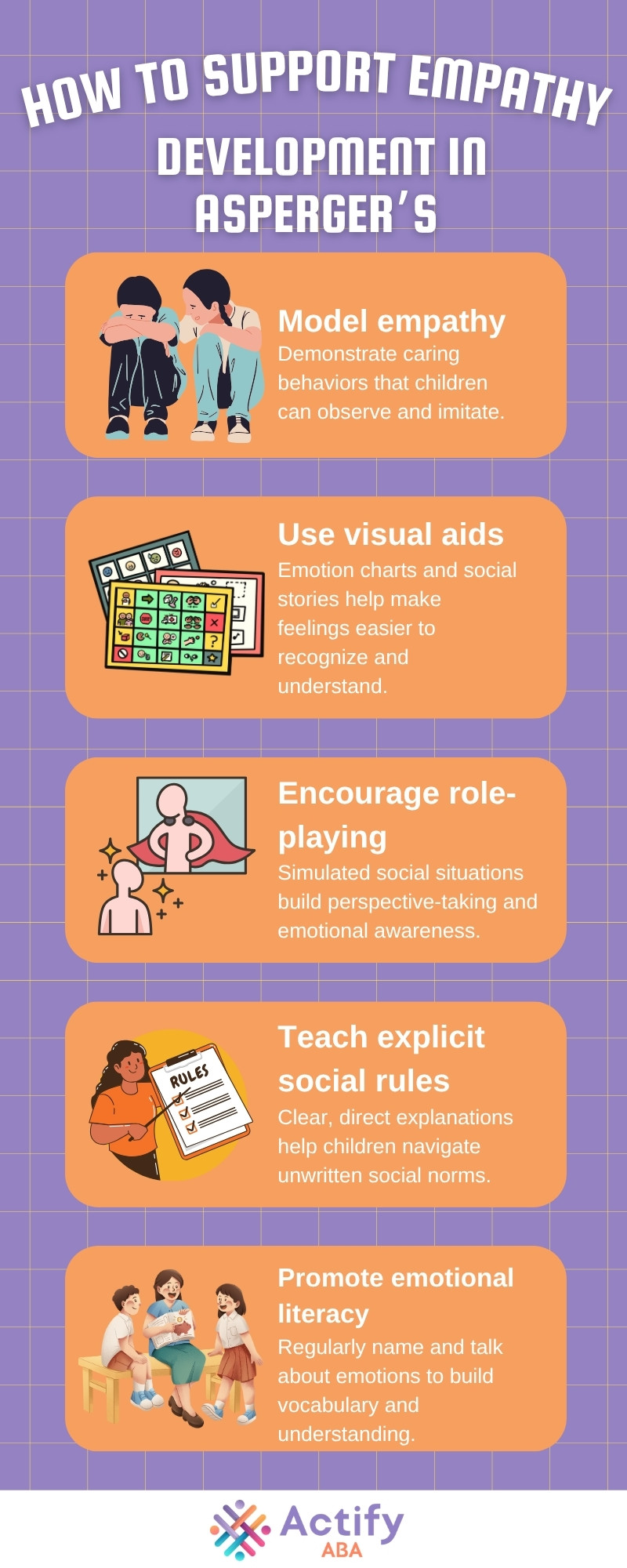
Key Points:
- The belief that Asperger’s lack of empathy is widespread but often misunderstood; empathy manifests differently in autistic individuals.
- Autistic people may struggle with cognitive empathy but frequently have strong emotional empathy and compassion.
- Understanding different types of empathy helps families support autistic loved ones more effectively.
Understanding empathy in the context of Asperger’s syndrome challenges one of the most common misconceptions about autism—that autistic individuals lack empathy. This belief is not only inaccurate but also deeply misleading.
In reality, many people with Asperger’s experience empathy in rich and meaningful ways, though they may express it differently due to unique neurological and social processing. While autistic individuals may struggle with cognitive empathy (understanding another’s perspective), they often have strong emotional empathy, meaning they deeply feel and care about others’ emotions.
In this article, we’ll go over the differences between cognitive and emotional empathy, why social communication challenges can mask empathetic intent, and how families can support the development of empathy using strategies like ABA therapy.
Do People With Asperger’s Lack Empathy?
No, individuals with Asperger’s do not lack empathy altogether. They often experience empathy differently from neurotypical people. Difficulties in social communication may affect how they express or recognize emotional cues, but they frequently feel strong emotional responses and concern for others.
The misconception largely stems from challenges in cognitive empathy—the ability to identify and understand another person’s feelings or perspective. However, many with Asperger’s have intact or even heightened emotional empathy, meaning they deeply feel others’ emotions, even if they struggle to express or respond in expected ways.
What is Empathy, and How Does It Differ in Asperger’s?
Empathy involves two primary components: cognitive empathy and emotional empathy. Understanding these helps clarify why Asperger’s might appear as if it involves a lack of empathy.
Cognitive empathy is the skill of recognizing and intellectually understanding someone else’s emotions or perspective. People with Asperger’s often find this challenging due to differences in social cognition, making it harder to read facial expressions, tone, or body language.
Meanwhile, emotional empathy is the ability to share and feel the emotions of others. Despite cognitive challenges, many autistic individuals experience strong emotional empathy, showing deep concern and compassion once they recognize another’s distress.
What are Common Misconceptions About Asperger’s and Empathy?
There are several myths that contribute to stigma around Asperger’s and emotional capacity. This may lead to misunderstandings, frustrations, or perceptions of aloofness by others. The emotional and social challenges can create barriers, but understanding these differences encourages patience and better communication.
Common misconceptions include:
1. Autistic People Don’t Care About Others
One of the most harmful misconceptions is that autistic individuals, including those with Asperger’s, lack care or concern for others. In truth, many form deep, meaningful emotional connections—they just may express affection or concern in ways that differ from neurotypical expectations.
2. Lack of Eye Contact Equals Lack of Empathy
Many assume that avoiding eye contact signals indifference or emotional distance. However, for autistic people, eye contact can be overwhelming or distracting. Their empathy may be present and strong, even if their gaze doesn’t meet traditional social norms.
3.Difficulty with Social Cues Means No Empathy
Struggling to read facial expressions or understand tone doesn’t mean someone lacks empathy. People with Asperger’s often care deeply but may require extra time or direct communication to fully grasp others’ emotional states.
4. Empathy Challenges Reflect Intentional Rudeness
Some may mistake blunt speech or missed social cues as disrespectful behavior. In reality, many autistic individuals are not being rude—they’re simply navigating communication through a different lens, often unaware of how their words are interpreted.
5. Misconceptions Lead to Unfair Judgments
These myths create unnecessary barriers to understanding. By acknowledging the difference between how empathy is felt and how it’s shown, families and educators can replace judgment with compassion and more effective support.
Recognizing these misconceptions allows families to approach relationships with understanding rather than judgment.
How Can Parents and Caregivers Support Empathy Development in Asperger’s?
Supporting empathy in children with Asperger’s focuses on enhancing social skills and emotional awareness while respecting individual differences. Building empathy is a gradual process that involves teaching recognition of emotions, practicing perspective-taking, and encouraging emotional expression.
Strategies to foster empathy include:

Patience and positive reinforcement go a long way in nurturing empathy-related skills.
What Role Does ABA Therapy Play in Supporting Empathy and Social Skills?
ABA (Applied Behavior Analysis) therapy plays a vital role in helping individuals with Asperger’s develop empathy and social communication skills. It focuses on teaching emotional recognition, perspective-taking, and appropriate social responses through structured, individualized strategies.
Therapists use evidence-based techniques to improve cognitive empathy while reinforcing emotional awareness in real-life situations. ABA also involves parent coaching to extend these skills at home, making it an effective, supportive approach for fostering meaningful social connections and emotional growth.
How Do Emotional and Cognitive Empathy Differences Impact Relationships?
Differences in empathy expression affect relationships with family, peers, and teachers. Awareness of these differences fosters more meaningful and compassionate interactions. People with Asperger’s may form deep attachments but express affection in less conventional ways.
Recognizing these alternative forms of empathy helps prevent misunderstandings and frustration. Educators and caregivers can support these relationships by adjusting expectations and offering explicit communication about feelings.
What are Some Signs That Suggest An Individual With Asperger’s is Showing Empathy?
Autistic individuals may have difficulty reading emotional cues or responding in expected social ways, but that doesn’t mean they don’t care. In fact, once they understand what someone else is feeling, they often respond with deep emotional sensitivity and concern.
Recognizing these unique signals of empathy can help parents, caregivers, and peers better connect with and support their loved ones.
Common signs that suggest empathy may include:
1. Attentiveness to Others’ Distress
Many individuals with Asperger’s respond with genuine concern after someone’s emotional state is clearly communicated. Their compassion often becomes evident once they understand what the other person is feeling.
2. Acts of Kindness and Helpfulness
Empathy may show through thoughtful gestures—offering help, sharing preferred activities, or maintaining routines that support a loved one’s comfort and happiness. These quiet actions can speak volumes.
3. Comforting Others in Their Own Unique Ways
Rather than using conventional verbal reassurances, autistic individuals might comfort someone by sitting close, sharing a favorite item, or engaging in a calming activity. These behaviors reflect empathy expressed in personalized ways.
4. Sustained Interest in a Loved One’s Wellbeing
Some with Asperger’s show empathy by persistently checking in, asking about someone’s day, or expressing concern over time. This steady attention demonstrates emotional investment and care.
5. Emotional Reactions to Others’ Joy or Sadness
Even if delayed or less obvious, emotional mirroring—like smiling when someone is happy or becoming quiet when someone is upset—can signal deep emotional empathy beneath the surface.
Understanding these signals can deepen appreciation for the autistic individual’s emotional world.

What are Practical Tips for Communicating Empathy to Someone With Asperger’s?
By using intentional strategies and creating space for open, judgment-free emotional expression, families and caregivers can foster stronger bonds with their loved ones. The goal isn’t to force conventional communication but to build bridges that honor how the autistic individual understands and expresses empathy.
Tips for expressing empathy to individuals with asperger’s include:
1. Use Direct and Clear Language
Avoid sarcasm, vague hints, or implied meanings. Instead, speak plainly and say exactly what you feel or need. Clear, literal communication makes it easier for individuals with Asperger’s to understand emotional content.
2. Be Patient During Emotional Processing
Allow extra time for the person to process emotional information or respond. Rushing the conversation can increase anxiety or confusion, while patience shows respect for their communication style.
3. Ask About Feelings Explicitly
Rather than guessing or assuming, ask direct questions like, “How are you feeling?” or “Did that upset you?” This helps foster open emotional dialogue in a way that feels manageable and clear.
4. Avoid Overwhelming Displays of Emotion
Intense emotional expressions may be distressing or difficult to interpret. Keeping your tone calm and body language steady can help the person feel safe and better able to engage empathetically.
5. Encourage Calm, Open Emotional Discussions
Create a safe space where feelings can be discussed regularly without pressure or judgment. Consistent, structured conversations about emotions help build emotional awareness and mutual empathy.
Clear and consistent communication strengthens mutual understanding.
Support Your Child’s Growth With ABA Therapy
If you’re seeking support to help your child with Asperger’s develop empathy and social skills, Actify ABA offers expert ABA therapy in Maryland. Our programs are designed to foster emotional understanding, enhance communication abilities, and build confidence in social situations—paving the way for deeper, more meaningful connections.
Contact us today to learn more about how ABA therapy can empower your child to grow emotionally, connect with others, and navigate the world with greater independence and confidence.
